Share your love of MythTake with some podcast merch! We now have t-shirts, stickers, magnets and more available on our TeePublic site.
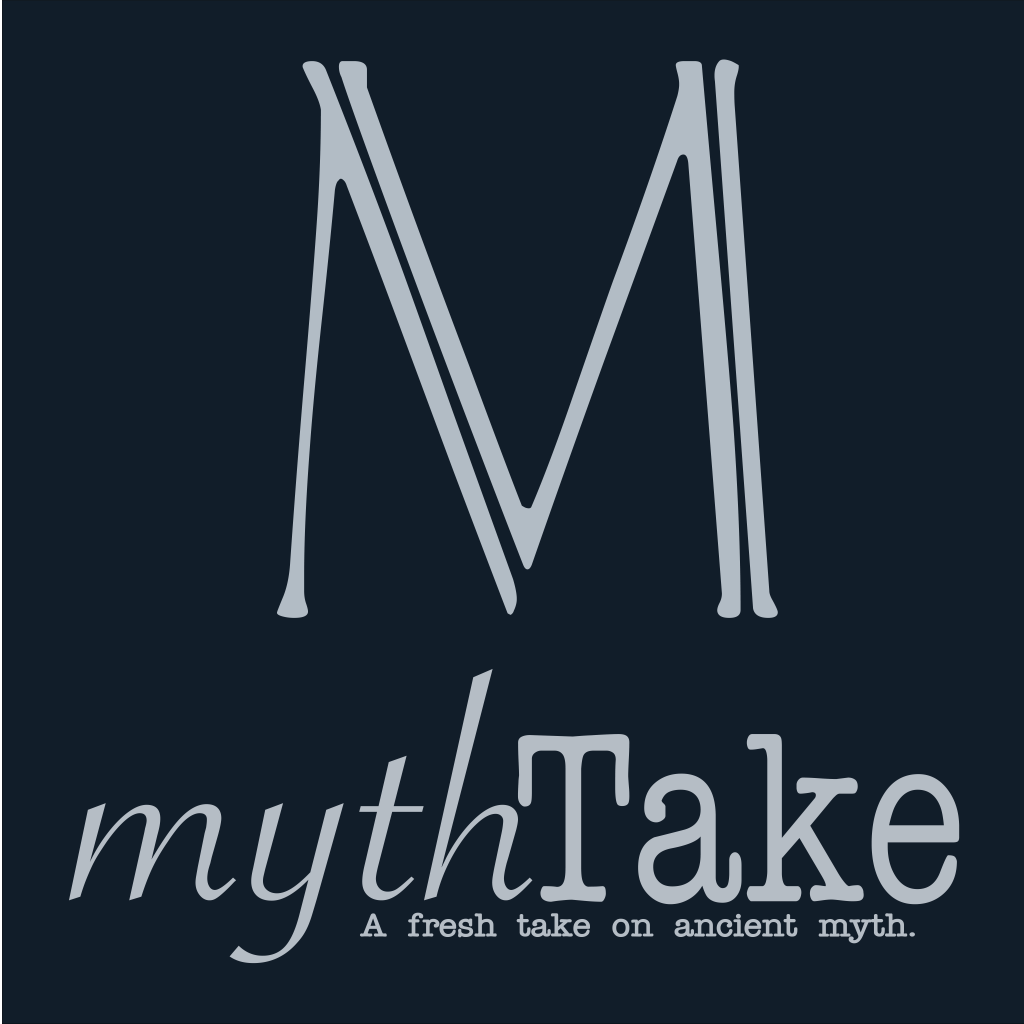

Share your love of MythTake with some podcast merch! We now have t-shirts, stickers, magnets and more available on our TeePublic site.

Hello friends,
We’re moving our podcast feed from Podbean to Acast. You won’t notice a thing– all of our existing episodes will remain available through your favourite podcast listening app.
Happy listening!
Alison & Darrin
We at MythTake are deeply saddened to learn of the harm done to women by fellow podcaster Ryan Stitt. We are deeply sorry if our past collaborations with and support of The History of Ancient Greece (THOAG) have led to women being harmed. There is no room for harassment in Classics or podcasting.
We have removed the crossover episode we released with THOAG from our feed and blog. We look forward to seeing new and diverse voices grow in our community and to helping elevate those voices where we can.
Scholars who have lost their platform are encouraged to reach out to the many independent Classics and History podcasts available. You can find some of those podcasts here, as well as links to other ongoing lists.
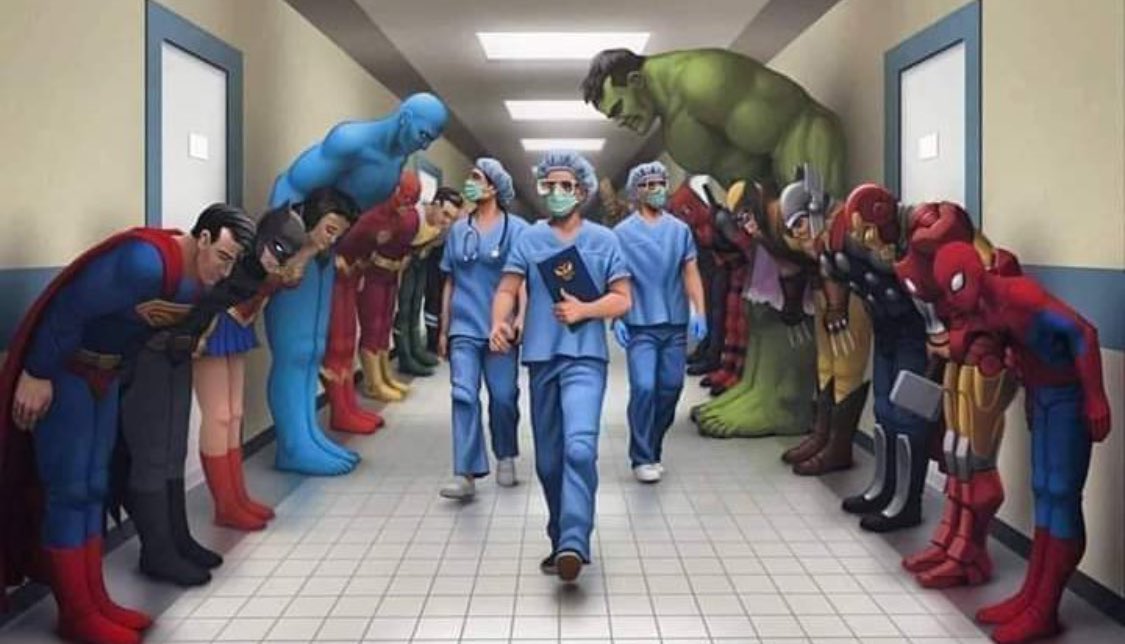
May 18, 2020
We’re baaack! We’ve been hearing a lot about heroes in the news lately and it’s got us thinking. The word’s being used to describe doctors, nurses, paramedics, delivery people, truck drivers, and grocery store workers– all the people who are keeping our society going through the COVID-19 pandemic. But what do we really mean when we call someone a hero? Do our heroes today resemble the heroes of myth? Or are we using the label “hero” to escape societal responsibilities?
Join Darrin and Alison for this special pandemic issue of MythTake. Guest appearance by our new feline production manager!
Mattel Commemorates the Heroes of the Pandemic With New Line of Action Figures (Adweek)
America’s Heroism Trap (Slate)
Healthcare Workers Deserve More than Hero Memes (Passage)
I’m An NHS Doctor. I Don’t Want To Be A Hero – I Want To Do My Job Without The Risks (Huffington Post)
Calling Healthcare Workers “Heroes” Sets Them Up to be Sacrificed (GQ)
‘Hero’ Rings Hollow (LA Times)
We want to hear from you!
Join us on Twitter @InnesAlison and @darrinsunstrum or @MythtakePodcast.
Give us a like, let us know what you think, and follow along on Facebook at MythTake.
Subscribe on iTunes or Google Play so you don’t miss an episode! Find our RSS on Podbean.
We’re a part of the #HumanitiesPodcasts podcasting community. Check out the hashtag and follow @HumCommCasters to find many more engaging and knowledgeable podcasts.
This week’s theme music: “Super Hero” by King Louie’s Missing Monuments from the album “Live at WFMU” (2011). Used under Creative Commons license and available from Free Music Archive.
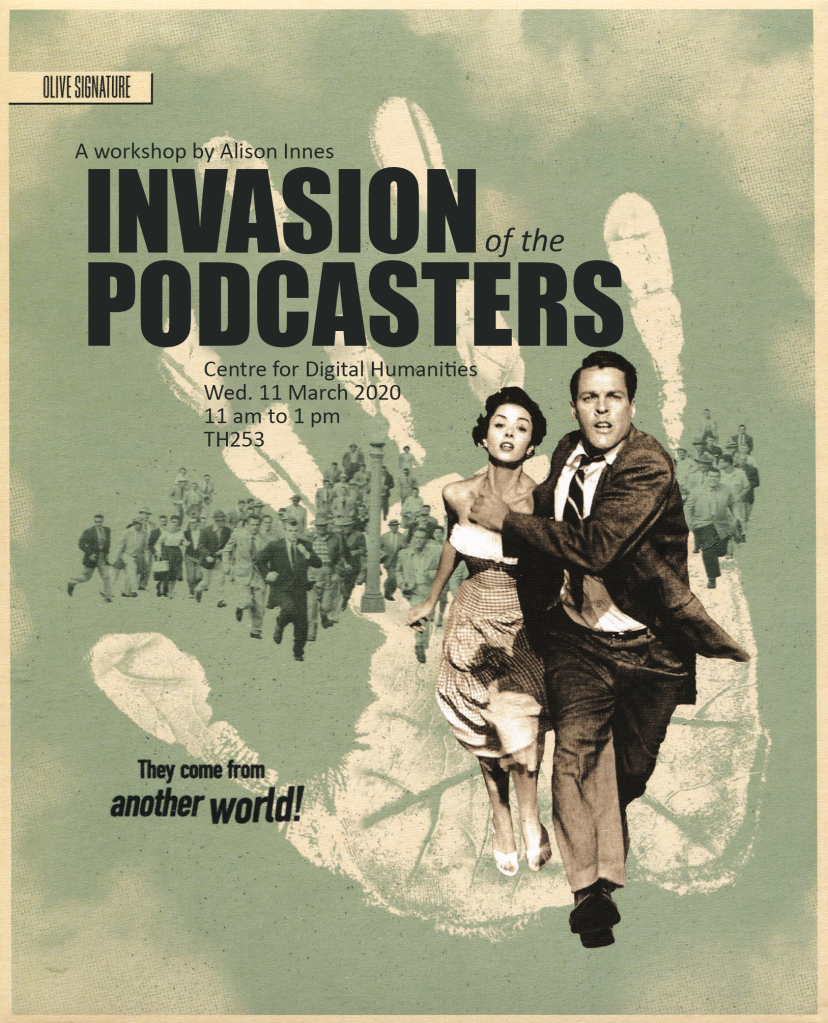
Once a fringe medium, podcasting has slowly and steadily grown to become mainstream. While big network names like I Heart Radio and Radiotopia are increasingly familiar to podcast listeners, there’s still room for the indie podcaster. Podcasts are in vogue and the listenership is growing; Apple has over half a million active podcasts in their listings as of 2020 and according to Nielson, over 16 million people in the US alone are podcast fans.
Podcasting offers a personal connection to your audience in a way that traditional radio or print doesn’t. The format is adaptable. They’re easy to create with a little know-how and topics can be as niche or broad as you wish. But with an overwhelming 30 million podcast episodes floating in the ether, how do you make your voice heard?
Join Alison Innes, Social Media Coordinator for the Faculty of Humanities and independent podcaster for a “Podcasting 101” workshop. Alison will share her experience co-creating MythTake and talk about the challenges and opportunities of independent podcasting. Learn more about the podcasting landscape and get a sneak peek behind the scenes of her latest podcasting project for the Faculty of Humanities.
Is podcasting right for you? Come and find out!
Episode 29 “From the Vault: Crossover” is no longer available.
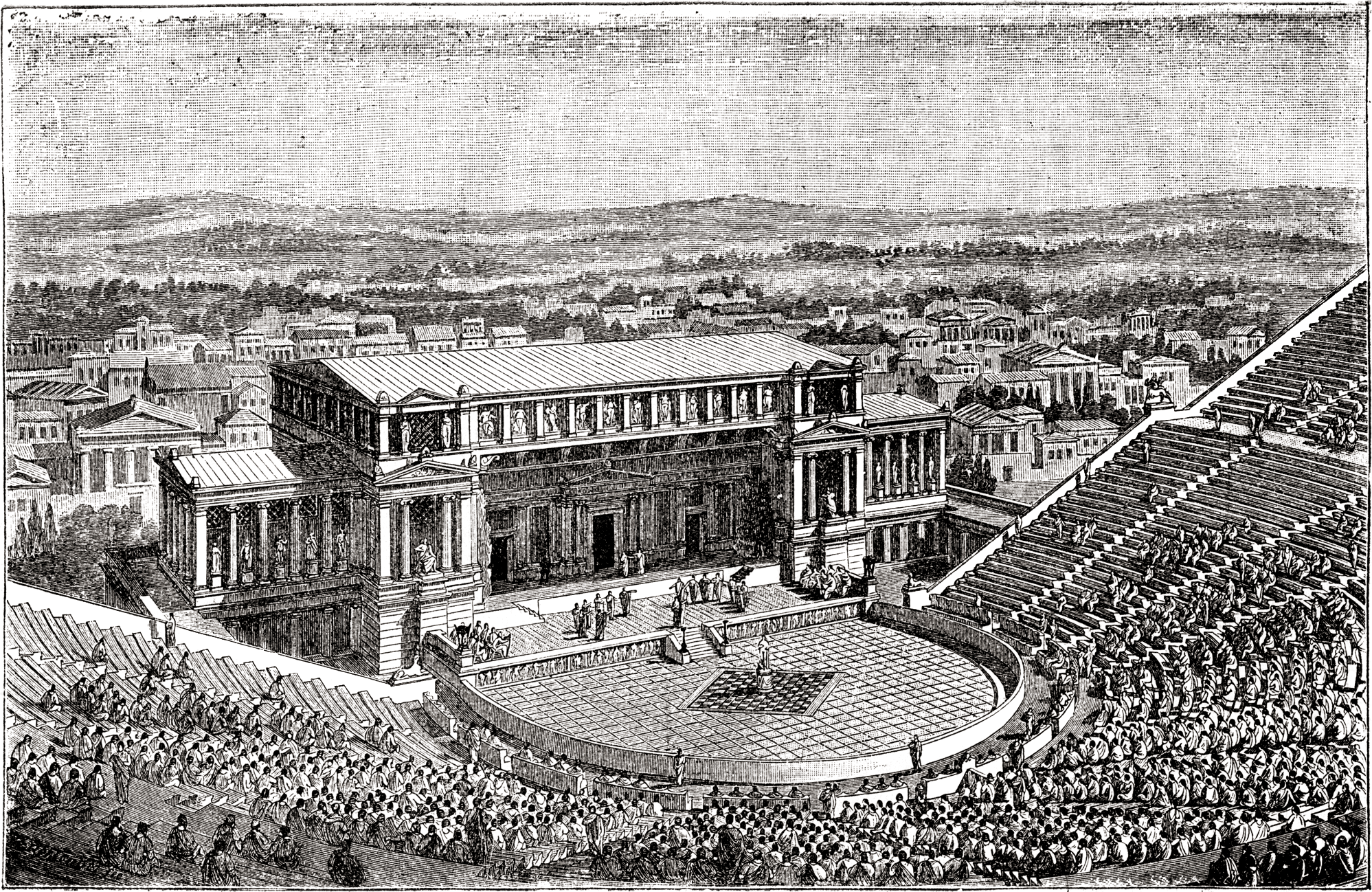
“When a man cannot choose, he ceases to be a man.” Stanley Kubrick
A central tenet of Greek Tragedy is the controversial idea that there are no innocent bystanders. That the community is simultaneously a strength but also a weakness. There are foundations of law, justice and tradition, but the actions of men can at times jeopardize not only themselves but those around them.
Though we witness the actions and hear the words of individuals, the ancient Greeks understood that these ‘actors’ are in part stand-ins (proxies) for the community at large. Their decisions – for right or wrong – will effect us all. The moment of decision, that leads to a course of action is the moment when the protagonist (or another) moves into jeopardy. A moment when uncertain consequences begin to spin outward, problematizing and pulling individual choices outside the traditional recognized norms (nomos) of the polis (for us here the ‘community’).
The heroes efforts to alter, twist, bend and or control fate/destiny or override the ‘unwritten laws’ of the gods is one that is not often well received by either the Chorus of a tragedy – or it’s audience. For in the day-to-day world of the traditional polis there is a harmony or ‘interweaving’ between state and ritual to the point that they are recognized by classical historians as one in the same. Any alterations in this unity would immediately be recognized by all in attendance.
The tension and force that is created by the singular hero of a play can warp the very fabric of the polis and move us all into this shared ‘danger-zone’. A dissonant landscape that is activated when human illusion and divine decree come into conflict.
No man (or hero) can step beyond, into or outside this space and hope to remain unchanged. Nor can those around them who now find their community jeopardized (or at least under divine scrutiny) seek the same assurance. It is this this movement of the individual, this ‘heresy’ (choice) that ultimately generates the often referenced Aristotelean end product of ‘catharsis’ evidenced in the collective.
The ‘heroic decision’ is not one to be taken lightly – they are not without import and even though they may be underwritten by a sacred Oath, there is no guarantee that they will bring harmony or peace to human affairs. In every case as the thoughts form the words of these characters and publicize their decisions, we are made to witness the ‘hamartia’ (error) that so often plagues our tragic heroes. They present to us the uncurbed pride of human will and the folly of a hubris that lies in wait to destroy a man – or a community – who opposes a divine decree.
All is not lost however, the hero may endure as might the community should the proper steps be taken. But rest assured things will not be the same. Death, destruction, and madness are often the end products of this disturbed world-order struggling to regain its equilibrium in an environment of fear and pity.

Hi there, listeners!
It’s been far too long since we last talked, so we thought we would drop you a line to let you know what’s up.
It’s been far too long since we have been in your ears. And we miss you very much.
Unfortunately, I wasn’t available to podcast in November due to an unplanned life event. But I am back now, and Darrin and I are both looking forward to resuming our monthly podcast schedule, such as it is!
Our special November episode was to be a crossover episode with one of our favourite podcasts The Endless Knot. We didn’t get it released, but they did! If you would like to hear our conversation with Aven and Mark of the Endless Knot, we hope you will hop over to their show and check it out.
For some seasonal listening, you may want to re-visit our Saturn episode. The Romans celebrated Saturnalia December 17 to 23rd with feasting, gift giving, gambling, and role reversals. In fact, many elements of the celebration were re-cast as the Christian holiday Christmas in the 3rd and 4th centuries.
In the meantime, Darrin and I wish you and the best of the holiday season and we very much look forward to being in your ears again in the new year with new episodes!
Happy holidays!
–Alison
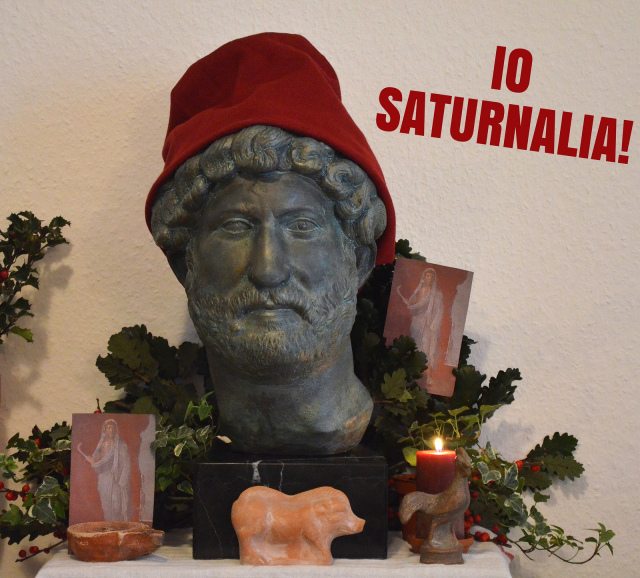
These people like our show so much, they decided to support us on Patreon! Thank you so much!
Aven McMaster & Mark Sundaram (Alliterative); Joelle Barfoot; Erika Dilworth; Stargate Pioneer (Better Podcasting); Greg Beu.
We want to hear from you!
Join us on Twitter @InnesAlison and @darrinsunstrum or #MythTake.
Give us a like, let us know what you think, and follow along on Facebook at MythTake.
Subscribe on iTunes or Google Play so you don’t miss an episode! Find our RSS on Podbean.
Like what you hear? Please support us on Patreon.
We’re a part of the #HumanitiesPodcasts podcasting community. Check out the hashtag and follow @HumCommCasters to find many more engaging and knowledgeable podcasts.
This week’s theme music: “Super Hero” by King Louie’s Missing Monuments from the album “Live at WFMU” (2011). Used under Creative Commons license. Music used under Creative Commons license and available from Free Music Archive.
This poem was inspired by Pausanias’ report of (Description of Greece 10.19.1) Hydna and her father, Scyllis, who volunteered to assist Greek forces by vandalizing the nearby Persian naval fleet (480 BCE).
by Darrin Sunstrum
As dreams unfold and manifest
Their glittering visions before us
I awoke anew into a time before this day
I awoke in the midst of a fateful night whose heroes
were daughter and father
A fearful moonlight danced above the Scione port
now swollen with the vessels of the enemy.
Hydna drew the veil from her head in the darkness
as a cool rain began to dampen her bared skin.
Scyllis crouched, through sheets of rain and wind
he surveyed the anchored jostling fleet below.
The empty beach was a vast trembling expanse
that flared in the fitful moonlight and pallid stars.
Arching across his vision, a sandy bulwark between safety
and danger, his worlds only fortification.
The winds offshore began to quicken and rise,
and before long Hydna and Scyllis
flowed from the headland to the waters dangerous edge.
Called by the noble and heroic spirit of
their own storm swept ancestors
Poseidon raised his briny trident and heaved the waters,
Tritons blast whipped the enemy decks
and the midnight sea began to rise and roll.
As Olympian powers stirred to defend
the lofty realm of Zeus.
A father and daughter slipped into the black waters.
They plumbed the familiar depths this night
not for shell or sponge, but in this time of challenge
their diving required a bitter harvest
from this sea of night.
With knives in their hands they sought
the connecting hawsers and lines.
They would sever these umbilicuses,
they would let the enemy ships be birthed unto the sea.
Deadly midwives of storm and rock
The clouds obscured Selene’s bright face
as they swam amongst the Xerxian host,
they dove below and as ships began to pull
on anchor lines that were no longer taught
they pitched toward the rocks and disaster at sea.
The knives of Hydna and Scyllis cut loose
the lines of many vessels that trying night.
Cut free to a clashing disaster amid the rocks
of Hellas.
They drew themselves from fateful waters,
as the winds died and the rain ceased.
Their evenings work accomplished,
for now to be taken up again another day,
by the bright sons of Themistocles,
and the wooden walls of Athens.
When thinking further on the hero and the worlds they inhabit, I was struck by the fact that for much of our experience of narrative, not only are we naturally expected to integrate with characters and their characterization, but much of what we do as the audience and/or readers of narrative is dependant upon our capacity to understand and recognize setting. Where the story takes place.
Places create stories? What an absurd concept.
Not really – if characters are given this privilege, why not the worlds that they inhabit? For many this may be included in their descriptions of genre but this lies outside of the scope of this exploration of heroes and their parallel lives. We are expected to handle narrative worlds as easily as our own.
MCU / DCEU (Marvel Comics Universe / DC Comics Extended Universe)
As Classicists and Historians we are trained, almost by default, with the capacity to inhabit the ‘mind-scapes’ and environments of the ancient world (Diskin, 2008). The heroes, gods and monsters of the ancient mythological mind-scape become for us a familiar or accustomed place, an ‘ethos’. It is the ‘homeworld’ of the heroic or from the narratological perspective the protagonist’s setting.
Whether we are reading the Archaic and Classical poems of Hesiod, Homer, Pindar or Plutarch we have accepted a construct of mediated reality, a framework that allows us to negotiate meaning. Like any good cosmogony (the birth of a universe), this one being mythical, fantastic and ancient, we populate it with figures; characters. Characters that are archetypal, universal or ideal is some way and name them heroes.
This process is no different from what is occurring in todays ‘heroic narrative’. The medium of popular heroic narrative has changed, but there is much that is familiar. The realm of the MCU (Marvel Comics Universe) and the DCEU (D.C. Extended Universe) are examples that have exploded across our television sets, our movies screens and streaming services. (Netflix / Amazon Prime / ShowMe / Sony Pictures / Hulu…) *Detect a trend here?*
It seems that wherever there exists a medium for communication and entertainment our ‘heroes’ are the pioneers. The pathfinders that are willing, ready and able to rush forth and make their world and our own familiar.
If we were continuing with Classical themes and what is called ‘Divine Myth’ we would almost certainly move into populating our world with the heroes, gods and monsters mentioned earlier. This ‘theogony’ (the birth of gods) places our ‘heroes’ (narrative functions) in a larger universe (cosmos). Like in the epic poems of Archaic Greece, today’s heroes (Superheroes) themselves materialize and coalesce inside a created world.
The modern pop-hero narratives–comic book hero, Superhero, call it what you will– manifest themselves in a created cosmos. Their worlds are like our own but enhanced in certain ways. Their worlds resonate with qualities that connect them with their principle players – the very heroes that live there.
Common examples of these uncanny yet ‘accustomed places’ (ethos) include the ‘gothic’ Gotham city, home to the vigilante hero Batman; the hidden Themiskyra of Wonder Woman; the Metropolis of Superman; the fictive and mythological undersea realm of Atlantis for Aquaman; and The African kingdom of Wakanda, home of the Black Panther. The Asgard & Midgard of Thor and even the oscillation that occurs between eras of time and place as evidenced in the popular hero Captain America are also examples.
It’s not enough to simply categorized heroes as Vladimir Propp has done as merely ‘dramatis personae’, as plot elements no more or less important than the magic ring, the dark forest, the guardian, the ruined castle and the dozens of other functions outlined in his groundbreaking “Morphology of a Folktale”.
This dispassionate and dismissive analysis of the hero overlooks his/her narratological function. Heroes are epistemological figures, they are ’thinking points’ – they are ’thinking portals’ that allow us access into their worlds.
As audiences (both poetic and literary) engage with them they/we are locked into a deepening cycle of exchange and self-definition. These epistemological figures and the worlds they inhabit allow us to negotiate new layers of meaning in our own world. They provide models for emulation, revulsion, elation, expectation – the list is endless.